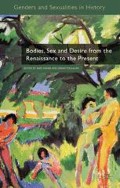Abstract
This chapter will seek to contribute to an intellectual history of ‘sexuality’. The key word is marked with inverted commas since I shall not be speaking of sexuality as if it were something that transcended historical circumstance. My aim here is to contribute to a history of thought in the sense in which Foucault and others use that term. A history of thought entails identifying the assumptions which, in a given period, helped to establish what questions were worth asking, and what things counted as knowledge. The time and place I shall focus on is eighteenth-century France, and I shall in fact find myself talking about eighteenth-century notions that bear a resemblance to modern sexual pathologies such as frigidity and impotence. But my aim throughout will be to hold those notions apart from modern ways of thinking. in order to mark their historical distinctiveness.
Access this chapter
Tax calculation will be finalised at checkout
Purchases are for personal use only
Preview
Unable to display preview. Download preview PDF.
Notes
Michel Foucault (1976) Histoire de la sexualité I, La Volonté de savoir (Paris: Gallimard), p. 101.
Nicolas Venette (1751 [1686]) La Génération de l’homme, ou tableau de l’amour conjugal considéré dans l’état du mariage (Nouvelle édition, Londres), I, pp. 323–34.
Martin Schurig (1720) Spermatologia Historica-Medica, h.e. Seminis Humani. Consideratio Physico-Medico-Legalis (Francofurti ad Moenum, sumptibus Johannis Beckii), Cap. 5, para 15;
Martin Schurig (1730) Gynaecologia Historica-Medica, hoc est Congressus Muliebris. Consideratio Physico-Medico-Forensis (Dresdae et Lipsiae: In officina libraria Hekeliana), Sect. 2, Cap. 1, paras 7–8.
Dr Félix Roubaud (1855) Traité de l’impuissance et de la stérilité chez l’homme et chez la femme, comprenant les moyens recommandés pour y remédier (Paris: J.-B. Baillière), pp. 37–8.
Dr W.-A. Hammond (n.d. 1903 [1890]) L’Impuissance sexuelle chez l’homme et la femme, 3e édition (Paris: Vigot Frères), pp. 264–5. Several decades later, Wilhelm Stekel is still dismissing and entertaining the question at the same time: ‘An idle controversy among many writers revolves around the question whether man’s voluptas is greater than woman’s during congressus sexualis. Even serious-minded authors devote to this question greater attention than it deserves.’ But then he adds: ‘We may state briefly that most writers decide this question in favor of the woman.’
Wilhelm Stekel (1953) Frigidity in Woman in Relation to her Love Life, Vol. 1, trans. James S. Van Teslaar (London: Vision, p. 96). For a brief discussion of Ovid’s version of the myth, see
Thomas Laqueur (1990) Making Sex: Body and Gender from the Greeks to Freud (Cambridge, MA: Harvard University Press), pp. 43–4.
For a discussion of libertine enlightenment as such, see Peter Cryle and Lisa O’Connell (2004) ‘Sex, Liberty and Licence in the Eighteenth Century’ in Peter Cryle and Lisa O’Connell (eds) Libertine Enlightenment: Sex, Liberty and Licence in the Eighteenth Century (Basingstoke: Palgrave Macmillan), pp. 1–6.
Corinne Harol (2004) ‘Faking It: Female Virginity and Pamela’s Virtue’, Eighteenth-Century Fiction, 16:2, 197–216, p. 206.
Georges-Louis Leclerc, Comte de Buffon (1971) De l’homme (Paris: L’Harmattan), présentation de Michèle Duchet; postface de Claude Blanckaert, p. 85.
J. Casanova de Seingalt (1908) Mémoires, suivis de Fragments des mémoires du Prince de Ligne (Paris: Garnier), III, pp. 387–8.
Crébillon fils (1968) Le Hasard du coin du feu, Œuvres complètes (Geneva: Slatkine Reprints), II, p. 138.
Crébillon, Le Sopha, p. 162. It should be clear that my reading of Le Sopha parts company with that of Madeleine Dobie, who says that Mazulhim ‘despite his reputation as a masterful seducer, actually suffers from impotence’. My objection to Dobie’s reading is that the word ‘actually’ is itself misleading and anachronistic as an account of the significance of these episodes. See Madeleine Dobie (2001) Foreign Bodies: Gender, Language, and Culture in French Orientalism (Stanford: Stanford University Press), p. 89.
For a critical discussion of the terms in which the problem arose in canon law, see Vincent Tagereau (1612) Discours sur l’impuissance de l’homme et de la femme. Auquel est déclaré que c’est qu’Impuissance empeschant et separant le mariage. Comment elle se cognoist. Et ce qui doit estre observé aux Procés de Separation pour cause d’Impuissance, conformément aux Saincts Canons et Decrets: et à ce qu’en ont écrit les Theologiens et Canonistes (Paris: Du Bray, Rousset).
See Jacques Rochette de La Morlière (1746) Angola in Patrick Wald Lasowski et al. (eds) (2000) Romanciers libertins du XVIIIe siècle, Vol. I (Paris: Gallimard), pp. 675–796.
Editor information
Editors and Affiliations
Copyright information
© 2011 Peter Cryle
About this chapter
Cite this chapter
Cryle, P. (2011). On the Unsteadiness of Sexual Truth in Eighteenth-Century France. In: Fisher, K., Toulalan, S. (eds) Bodies, Sex and Desire from the Renaissance to the Present. Genders and Sexualities in History. Palgrave Macmillan, London. https://doi.org/10.1057/9780230354128_10
Download citation
DOI: https://doi.org/10.1057/9780230354128_10
Publisher Name: Palgrave Macmillan, London
Print ISBN: 978-1-349-32900-7
Online ISBN: 978-0-230-35412-8
eBook Packages: Palgrave History CollectionHistory (R0)

